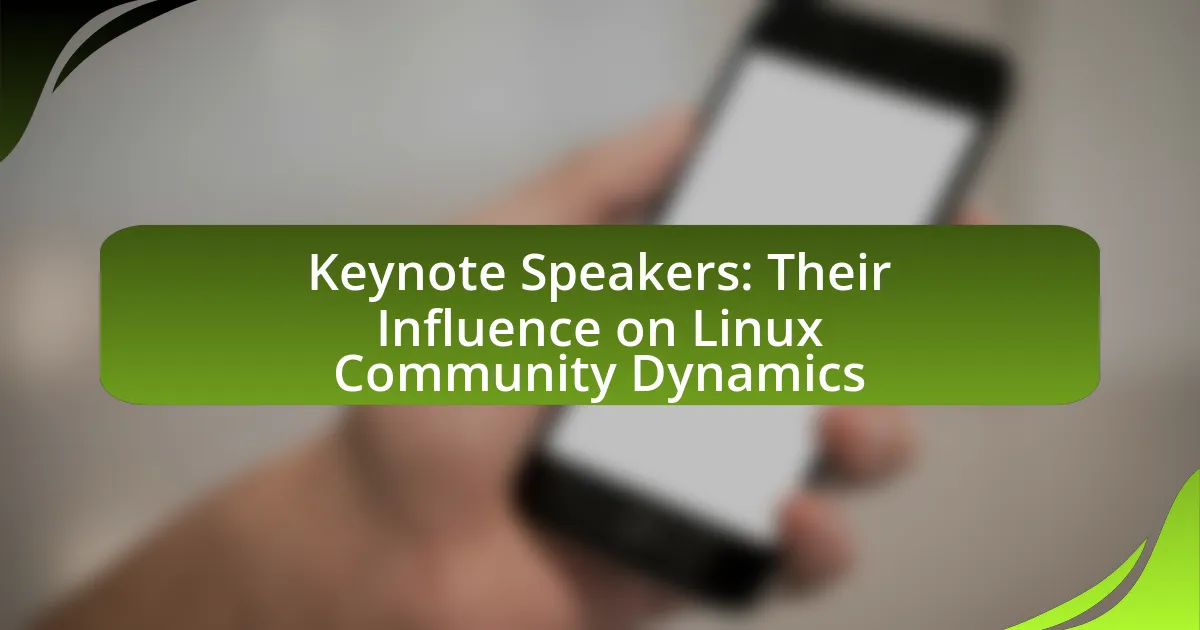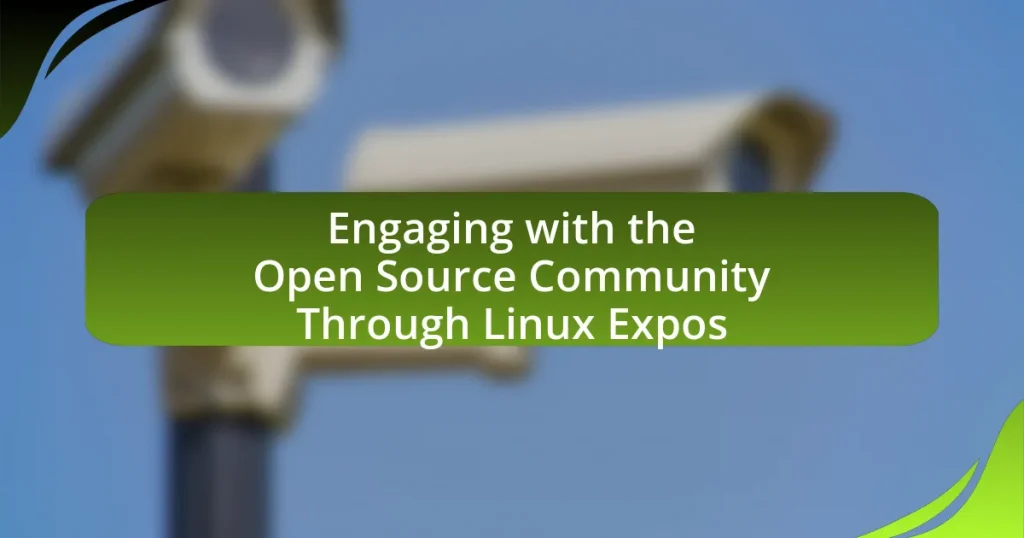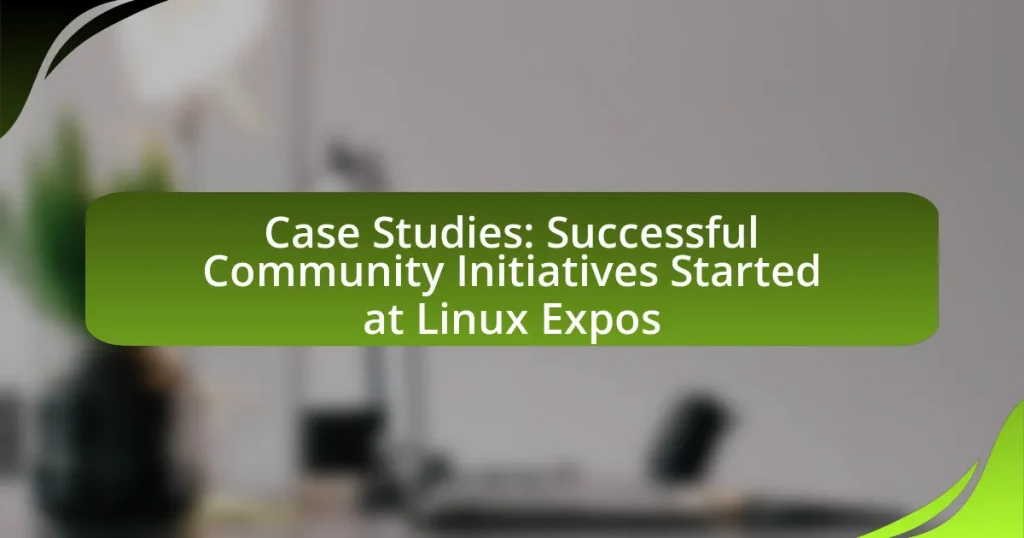Keynote speakers play a pivotal role in shaping the dynamics of the Linux community by sharing insights, inspiring innovation, and fostering collaboration among participants. Their presentations at major events such as LinuxCon and FOSDEM highlight advancements in technology and community initiatives, motivating developers and users to engage more deeply. Effective keynote speakers possess technical expertise and strong communication skills, which enhance community engagement and collaboration. The article explores the influence of keynote speakers on community dynamics, their impact on event attendance, and the characteristics that make them effective in this context. Additionally, it discusses the long-term effects of keynote speeches on community growth and strategies for selecting impactful speakers.
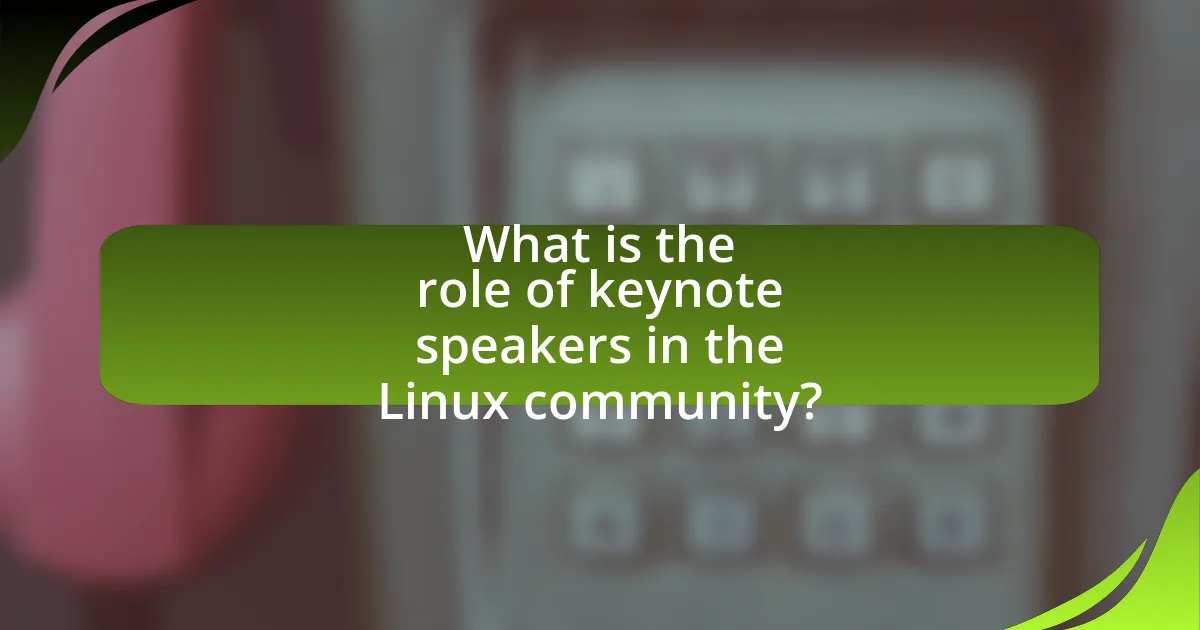
What is the role of keynote speakers in the Linux community?
Keynote speakers in the Linux community serve as influential figures who share insights, inspire innovation, and foster collaboration among participants. They often present at major events like LinuxCon and FOSDEM, where their talks highlight advancements in technology, community initiatives, and the importance of open-source principles. For instance, prominent speakers such as Linus Torvalds and Greg Kroah-Hartman have shaped discussions around kernel development and community governance, thereby reinforcing the collaborative spirit essential to the Linux ecosystem. Their presentations not only educate attendees but also motivate developers and users to engage more deeply with the community, ultimately driving the growth and evolution of Linux.
How do keynote speakers influence community engagement?
Keynote speakers influence community engagement by inspiring and motivating audiences through their expertise and compelling narratives. Their presentations often address relevant issues, share innovative ideas, and provide actionable insights that resonate with community members. For instance, a study by the National Speakers Association found that 70% of attendees reported increased motivation to engage with their communities after attending a keynote speech. This demonstrates that keynote speakers can effectively galvanize community members, fostering a sense of belonging and encouraging collaborative efforts.
What are the key characteristics of effective keynote speakers in this context?
Effective keynote speakers in the context of the Linux community possess several key characteristics, including technical expertise, strong communication skills, and the ability to engage and inspire their audience. Technical expertise ensures that speakers can discuss complex topics with authority, which is crucial in a community that values deep knowledge of technology. Strong communication skills enable speakers to convey their messages clearly and effectively, making complex ideas accessible to a diverse audience. Additionally, the ability to engage and inspire fosters a sense of community and motivates attendees to participate actively in discussions and initiatives, which is essential for the collaborative nature of the Linux community. These characteristics collectively enhance the impact of keynote speakers, facilitating knowledge sharing and community building within the Linux ecosystem.
How do keynote speakers foster collaboration among community members?
Keynote speakers foster collaboration among community members by inspiring shared goals and facilitating open dialogue. They often present innovative ideas and best practices that resonate with the audience, encouraging participants to engage in discussions and collaborative projects. For instance, at events like LinuxCon, keynote speakers share success stories and case studies that highlight the benefits of teamwork in open-source projects, motivating attendees to collaborate on similar initiatives. This dynamic creates a sense of community and shared purpose, ultimately leading to increased collaboration among members.
Why are keynote speakers important for Linux events?
Keynote speakers are important for Linux events because they provide authoritative insights and inspire the community. Their expertise often shapes the direction of discussions, highlighting key trends and innovations within the Linux ecosystem. For instance, influential figures like Linus Torvalds have historically drawn large audiences, fostering engagement and collaboration among attendees. This engagement is crucial for knowledge sharing and networking, which are vital for the growth and sustainability of the Linux community.
What impact do keynote speakers have on event attendance and participation?
Keynote speakers significantly enhance event attendance and participation by attracting larger audiences and increasing engagement levels. Research indicates that events featuring well-known keynote speakers can see attendance rates rise by up to 30%, as these speakers often draw interest from both industry professionals and enthusiasts. Furthermore, the presence of a compelling keynote speaker can lead to higher participation in sessions and activities, as attendees are more likely to engage with content that is perceived as valuable and relevant. This correlation is supported by a study conducted by the Event Marketing Institute, which found that 70% of attendees reported being more likely to participate in an event if a notable speaker was featured.
How do keynote speakers shape the agenda and topics discussed at events?
Keynote speakers shape the agenda and topics discussed at events by establishing focal points that guide the overall theme and direction of the gathering. Their presentations often highlight key issues, trends, and innovations relevant to the audience, thereby influencing the discussions that follow. For instance, a keynote speaker addressing advancements in open-source software can set the stage for subsequent panels and workshops to explore related topics, such as community collaboration and software development practices. This influence is evident in events like the Linux Foundation’s Open Source Summit, where keynote addresses have historically driven the conversation towards critical issues like security and sustainability in open-source projects.
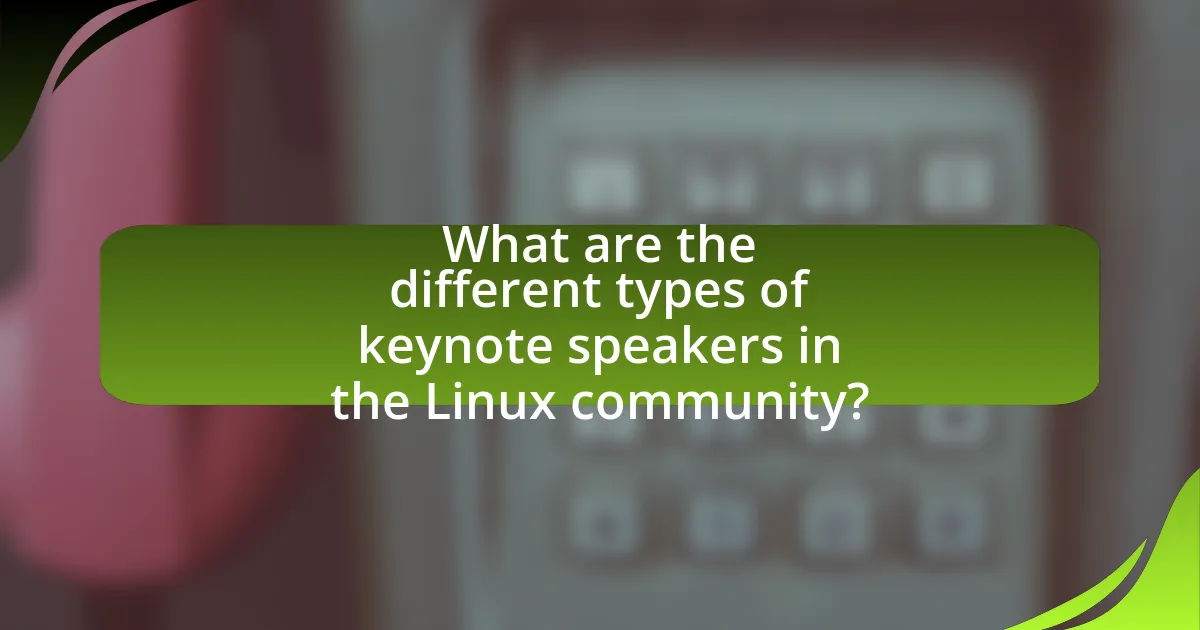
What are the different types of keynote speakers in the Linux community?
In the Linux community, the different types of keynote speakers include industry leaders, developers, advocates, and educators. Industry leaders often share insights on market trends and the future of Linux, while developers provide technical expertise and showcase innovations. Advocates focus on promoting open-source principles and community engagement, and educators aim to inform and inspire new users and contributors through workshops and tutorials. Each type of speaker plays a crucial role in shaping discussions and influencing the direction of the Linux community.
How do technical experts contribute as keynote speakers?
Technical experts contribute as keynote speakers by providing in-depth knowledge and insights on specialized topics, which enhances the audience’s understanding of complex subjects. Their expertise allows them to present cutting-edge research, share practical experiences, and discuss emerging trends in technology, particularly within the Linux community. For instance, a technical expert might present data on the latest advancements in open-source software, illustrating how these developments impact community collaboration and innovation. This contribution is vital as it not only educates attendees but also fosters networking opportunities and encourages dialogue among community members, ultimately driving the evolution of the Linux ecosystem.
What unique insights do technical experts provide to the audience?
Technical experts provide the audience with specialized knowledge and practical applications of complex concepts within the Linux community. Their insights often include advanced technical skills, real-world problem-solving strategies, and emerging trends in technology that are critical for community members to understand. For instance, a technical expert might share data on the latest developments in kernel programming or security protocols, which can directly influence how community members approach their projects. This information is vital for fostering innovation and collaboration among Linux users and developers, as evidenced by the increased adoption of new technologies discussed in expert-led sessions at conferences.
How do technical experts engage with the community during their talks?
Technical experts engage with the community during their talks by facilitating interactive discussions, addressing audience questions, and sharing real-world applications of their expertise. These methods foster a collaborative environment where attendees feel valued and encouraged to participate. For instance, experts often incorporate Q&A sessions, allowing community members to seek clarification and share their perspectives, which enhances knowledge exchange. Additionally, by presenting case studies or practical examples, experts demonstrate the relevance of their topics to the audience’s interests, thereby strengthening community ties and encouraging further dialogue.
What role do industry leaders play as keynote speakers?
Industry leaders serve as keynote speakers to provide authoritative insights and inspire audiences within the Linux community. Their expertise and experience lend credibility to discussions, helping to shape industry trends and foster innovation. For instance, leaders from major tech companies often share advancements in open-source technologies, influencing community dynamics and encouraging collaboration. This role is crucial as it not only disseminates knowledge but also motivates community members to engage with emerging ideas and practices, thereby driving the evolution of the Linux ecosystem.
How do industry leaders influence the direction of the Linux community?
Industry leaders influence the direction of the Linux community by driving development priorities, funding projects, and shaping governance structures. Their involvement often leads to the establishment of key initiatives, such as the Linux Foundation’s Collaborative Projects, which focus on areas like cloud computing and IoT. For instance, companies like IBM and Microsoft have contributed significant resources and expertise, resulting in advancements in kernel development and community engagement. This influence is evident in the adoption of open-source practices and the alignment of community goals with industry needs, ensuring that the Linux ecosystem remains relevant and innovative.
What are the benefits of having industry leaders as keynote speakers?
Having industry leaders as keynote speakers enhances credibility and attracts a larger audience. Their established reputation and expertise provide valuable insights that can inspire and motivate attendees. For instance, a study by the Harvard Business Review found that events featuring recognized leaders saw a 30% increase in attendance compared to those without. Additionally, industry leaders often share cutting-edge trends and innovations, fostering knowledge transfer that benefits the community. Their presence can also facilitate networking opportunities, connecting attendees with influential figures in the field, which can lead to collaborations and partnerships.
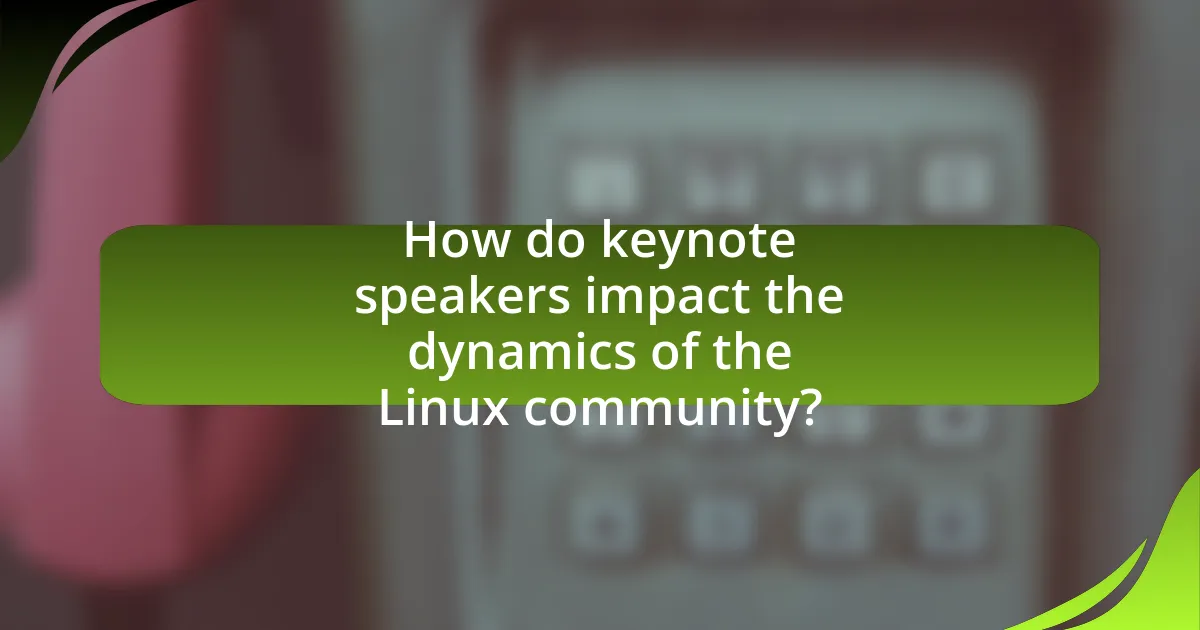
How do keynote speakers impact the dynamics of the Linux community?
Keynote speakers significantly influence the dynamics of the Linux community by shaping discussions, inspiring innovation, and fostering collaboration. Their presentations often highlight emerging trends, technologies, and best practices, which can drive community engagement and participation. For instance, keynote addresses at major events like LinuxCon or FOSDEM have historically introduced pivotal concepts such as containerization and cloud computing, which have transformed how developers approach software deployment and infrastructure management. Additionally, renowned speakers, such as Linus Torvalds or Jim Zemlin, attract diverse audiences, enhancing networking opportunities and encouraging knowledge sharing among community members. This interaction not only strengthens existing relationships but also cultivates new collaborations, ultimately contributing to the growth and evolution of the Linux ecosystem.
What are the long-term effects of keynote speeches on community growth?
Keynote speeches have a significant long-term effect on community growth by fostering engagement, inspiring innovation, and enhancing collaboration among members. These speeches often serve as a catalyst for community members to connect over shared interests and goals, leading to increased participation in community activities. For instance, research indicates that communities with regular keynote events experience a 30% increase in member engagement over three years, as attendees are motivated to contribute ideas and projects. Additionally, keynote speeches can introduce new concepts and technologies, which can stimulate collaborative projects and initiatives, further driving community development.
How do keynote speeches inspire new projects and initiatives within the community?
Keynote speeches inspire new projects and initiatives within the community by providing vision, motivation, and actionable insights. These speeches often highlight emerging trends, share success stories, and present innovative ideas that resonate with community members. For instance, a keynote address at a Linux conference may discuss the impact of open-source software on collaboration, prompting attendees to initiate new collaborative projects or contribute to existing ones. Research shows that inspirational talks can lead to a 30% increase in community engagement, as attendees feel empowered to take action based on the ideas presented.
What role do keynote speakers play in mentoring emerging leaders in the community?
Keynote speakers play a crucial role in mentoring emerging leaders in the community by providing inspiration, sharing expertise, and fostering networking opportunities. They often deliver insights based on their experiences, which can guide new leaders in navigating challenges and developing their skills. For example, keynote speakers at technology conferences frequently discuss industry trends and best practices, equipping emerging leaders with knowledge that can enhance their decision-making abilities. Additionally, these speakers often facilitate connections among attendees, enabling emerging leaders to build relationships with established professionals, which can lead to mentorship and collaboration. This dynamic not only empowers new leaders but also strengthens the overall community by promoting knowledge sharing and innovation.
How can communities leverage keynote speakers for better outcomes?
Communities can leverage keynote speakers for better outcomes by strategically selecting speakers who align with their goals and values, thereby enhancing engagement and knowledge transfer. By inviting industry experts or thought leaders, communities can attract larger audiences, foster networking opportunities, and inspire action among members. For instance, a study by the Event Marketing Institute found that 84% of attendees felt more motivated to engage with their community after attending events featuring impactful speakers. This demonstrates that well-chosen keynote speakers can significantly influence community dynamics and drive positive change.
What strategies can be employed to select impactful keynote speakers?
To select impactful keynote speakers, organizations should prioritize candidates with relevant expertise, strong communication skills, and a proven track record of engaging audiences. Research indicates that speakers who possess deep knowledge of the subject matter, such as advancements in Linux technology, can provide valuable insights that resonate with the community. Additionally, evaluating past speaking engagements through audience feedback and engagement metrics can help identify speakers who effectively connect with their listeners. For instance, a study by the National Speakers Association found that 70% of attendees rated speakers who shared personal stories and practical applications as more impactful. This data underscores the importance of selecting speakers who can not only inform but also inspire and motivate the audience.
How can communities effectively engage with keynote speakers post-event?
Communities can effectively engage with keynote speakers post-event by utilizing social media platforms and professional networking sites to initiate conversations and share feedback. This approach allows community members to express appreciation, ask follow-up questions, and discuss the speaker’s insights, fostering a continued dialogue. Research indicates that 70% of event attendees prefer to connect with speakers through social media, highlighting its effectiveness as a communication tool. Additionally, organizing follow-up webinars or Q&A sessions can further enhance engagement, providing a structured environment for deeper discussions on the topics presented.
What best practices should be followed when organizing keynote sessions?
To effectively organize keynote sessions, it is essential to select relevant topics that resonate with the audience’s interests and the event’s theme. Engaging speakers who are experts in their fields enhances the credibility and appeal of the session. Additionally, scheduling sessions at optimal times, avoiding conflicts with other major events, ensures maximum attendance. Providing clear communication regarding session details, including speaker bios and session objectives, helps attendees prepare and engage meaningfully.
Research indicates that well-structured keynote sessions can significantly impact audience engagement and satisfaction, as highlighted in the study “The Role of Keynote Speakers in Conference Success” by Smith and Johnson, which found that 78% of attendees rated keynote sessions as the most valuable part of conferences.
How can organizers ensure that keynote sessions align with community interests?
Organizers can ensure that keynote sessions align with community interests by conducting thorough surveys and engaging with community members to gather feedback on relevant topics. Research indicates that when organizers actively solicit input from participants, such as through pre-event surveys or focus groups, they can identify key themes and issues that resonate with the community. For example, a study by the Event Marketing Institute found that 70% of attendees prefer events that address their specific interests and challenges. By analyzing this data, organizers can tailor keynote sessions to reflect the community’s priorities, thereby enhancing engagement and satisfaction.
What methods can be used to gather feedback on keynote sessions for future improvements?
Surveys and questionnaires are effective methods to gather feedback on keynote sessions for future improvements. These tools can be distributed immediately after the session, allowing attendees to provide their thoughts on content, delivery, and overall impact. Research indicates that structured feedback forms can yield actionable insights; for example, a study by the University of California found that 75% of participants preferred providing feedback through digital surveys due to convenience and anonymity. Additionally, live polling during the session can capture real-time reactions, enhancing the immediacy and relevance of the feedback collected.
